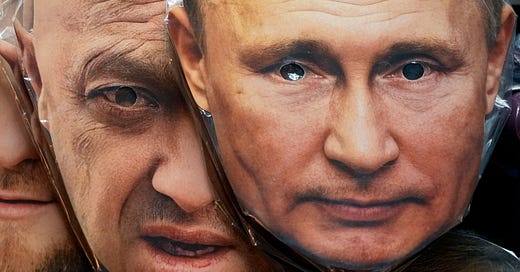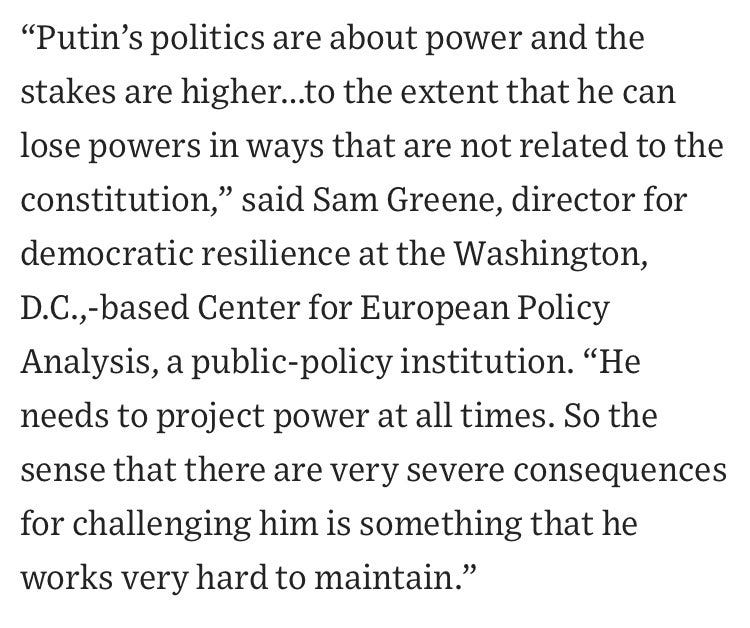Evgeny Prigozhin, as best I can tell, is dead.
(When I wrote back on July 26th that my planned August break from this newsletter might be interrupted by some event or another, I didn’t have this in mind — even if much of the rest of the Russia-watcher crowd had been on a Prigozhin death watch ever since his mutiny in June.)
When the news broke that a plane reported to be carrying Prigozhin and his field commander, Dmitry Utkin, had crashed on Tverskaya oblast, my first response was curmudgeonly: I have no way of knowing whether he was assassinated or not, and so, frankly, I don’t care.
As Tanya Stanovaya wrote in the New York Times, “Putin had every reason to want Prigozhin gone.” Does that mean Putin killed him? No. That’s not how cause and effect works.
Now, to be clear, do I think it’s possible that Vladimir Putin is behind Prigozhin’s death? Of course I do. Probable, even. Do I have any way of verifying that? No — and neither does anyone else out there. That hasn’t, of course, stopped people from speculating, and on some level that’s fine. On that same level, I suppose I might look silly for denying the obviousness of what seems so, well, obvious.
But the reason why I don’t want to get involved in the conversation about whether or not Putin killed Prigozhin is because if we’re interested in the future of Russian politics, it doesn’t fundamentally matter whether Putin killed Prigozhin. What matters is whether Russians — from members of the elite down to ordinary citizens — believe that Putin killed Prigozhin. At the end of the day, it’s that belief, not the facts, that will shape Russians’ response to Prigozhin’s death.
Let’s spend a few minutes thinking about how that might play out — starting with the elites. In an interview with the Wall Street Journal’s Ann Simmons not long after the news broke, I tried to outline two likely vectors of the elite thought process, starting with the one in the Kremlin:
Now, again, I don’t know or care whether Putin killed Prigozhin, but that’s irrelevant. Putin cares about appearances and interpretations, and so whatever happened with Prigozhin, Putin’s paramount concern is spin. Even if Putin doesn’t want people to think that he killed Prigozhin, he also doesn’t want people to think that he didn’t kill Prigozhin. The ambiguity here is key. It gets the core message of cause-and-consequence across while allowing people just enough doubt not to fall into abject panic. (Am I living in a country where the president shoots planes out of the sky? is not a question Putin particularly wants people to ask themselves.)
But that ambiguity only goes so far, and that’s part two of the thought process:
In other words, if you’re a member of the elite and you’re afraid that the president might one day decide to blow up your private jet, it’s pretty clear how to avoid that unfortunate circumstance: don’t challenge the Kremlin.
If I had to guess, then, I think Putin is probably good when it comes to the elite. There is still some possibility, I suppose, that this could create a ‘now-or-never’ moment of realization for the elite, and thus set the stage for a coup, but too many potential ‘now-or-never’ moments have come down on the side of ‘never’ for me to bet on that eventuality.
To me, though, the more interesting question is how do the public respond. As we saw during the mutiny back in June—recall scenes of Wagner troops being feted in Rostov—Prigozhin has a certain legitimacy among the Russian population. In the immediate aftermath of the uprising, Putin tried to give Prigozhin what I would call ‘the Navalny treatment’, referring to him as “that man”, rather than by name. The problem is, Prigozhin isn’t Alexei Navalny: unlike the jailed opposition leader, who is rarely mentioned in official media and never in a good light, most Russians have spent much of the last 18 months hearing about Prigozhin as a hero.
If ordinary Russians come to the conclusion that Prigozhin was assassinated, then, it could potentially make for tens of millions of very interesting dinner-table conversations. I would not take for granted that people will automatically come to the conclusion that Prigozhin got what was coming to him—although there is evidence that even some in Prigozhin’s camp are coming exactly to that conclusion.
I’m not predicting a revolution here—in general, I would never predict a revolution, because I don’t think they’re predictable—but I do think we’ll learn a lot from how things play out in public opinion. In particular, we’ll learn about the ability of the Kremlin’s media machine to shift public opinion, taking someone well known to most Russians as a positive figure and making them believe his death was, if not deserved, at least inconsequential.
We will also learn something about the extent to which Russians’ loyalty adheres narrowly to Putin, or more broadly to the ideology of war. If ordinary Russians come to the conclusion that Prigozhin was assassinated but do not buy the line that he was a traitor, they will face a choice: support Putin, or support the cause for which Putin has asked them to sacrifice. History suggests that most Russians will break on the side of Putin, but, as the investment bankers tell us, past performance is not a predictor of future results.
For all of this, social context is key. Individual Russians—whether of the elite or ordinary variety—may have their own views about all of this, but those views will be shaped powerfully, if not outright determined, by their social interactions. When faced with a fundamentally unknowable reality (was it, or was it not, an assassination?), social theory tells us, people tend to look around them for clues about how to fill in the blanks. Some people may be content to believe something no one around does, but most seek consensus. Indeed, the search for that consensus is the impetus behind most conversations that most people have about politics and current affairs. Hence the earlier reference to tens of millions of dinner-table conversations: that’s where the final calculus of the Prigozhin affair will take shape.






I have, like many others, concluded that Putin authorized the bombing of Prigozhin's private jet and killing of all on board. After all, strong-man leaders need to keep their subordinates in line. ("Will no-one rid me of this troublesome priest?")
To me the more interesting thought is, what if Putin didn't authorize it? Then what does he do?
Thanks for this thoughts! But, let’s go one step behind: Do we really know, prigoshin is dead?